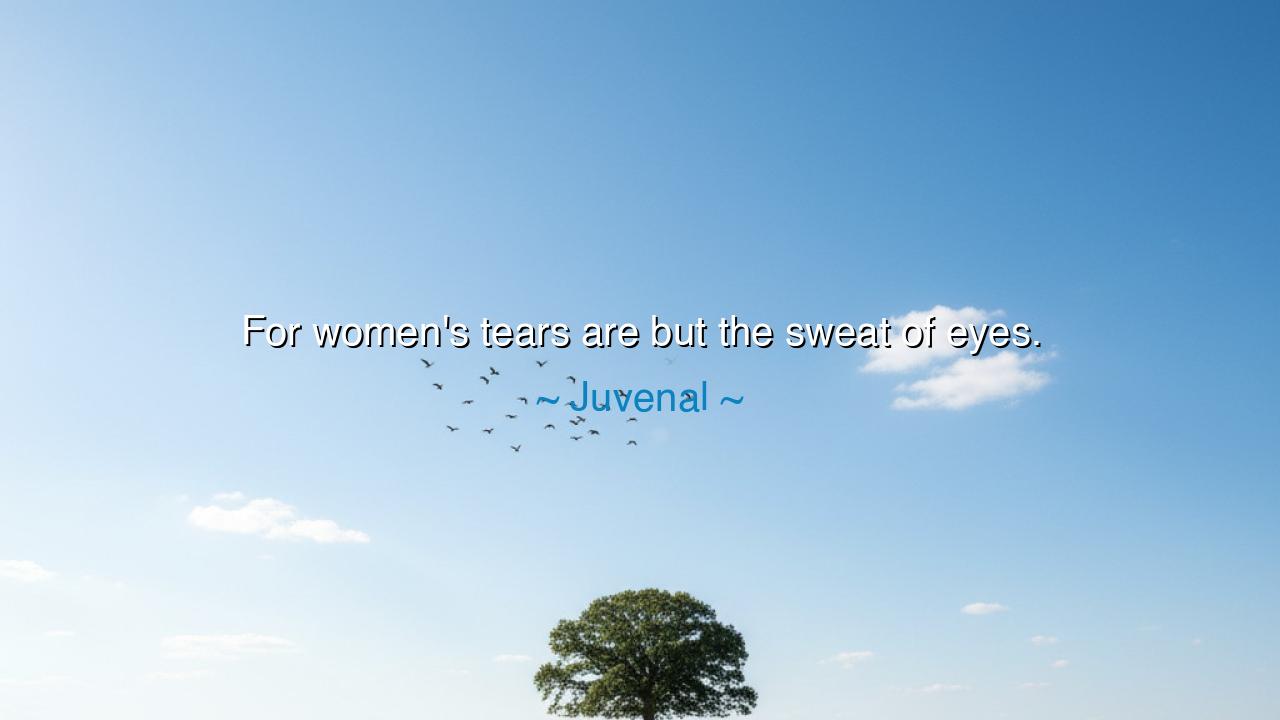
For women's tears are but the sweat of eyes.






Hear the biting words of Juvenal, the Roman satirist, who declared: “For women’s tears are but the sweat of eyes.” At first, the phrase strikes with cynicism, reducing the most intimate of human emotions to mere physical reaction. Yet within this sharp satire lies both a reflection of Rome’s distrust toward appearances and a warning that not all grief, nor all sorrow, is as pure as it seems. Juvenal sought not to condemn women alone, but to expose the masks humanity wears, reminding us that tears may conceal as much as they reveal.
The origin of this saying is found in Juvenal’s Satires, works steeped in the fire of critique against the corruption, hypocrisy, and decadence of his age. In Rome, tears could be both weapon and performance. They might win pity in courts of law, sway lovers in moments of betrayal, or soften rulers in their judgments. Thus Juvenal, weary of deceit, declared that tears were little more than the body’s artifice—the sweat of eyes, as sweat itself is the body’s natural excretion. In this he warns us: beware of appearances, for sorrow can be feigned, and compassion exploited.
History offers us lessons where tears shaped destiny. Consider Cleopatra, queen of Egypt, who knew well how to wield emotion as a tool of power. Accounts tell of her tears before Julius Caesar and later Mark Antony, not only as signs of passion but also as instruments of persuasion, designed to secure alliances and preserve her throne. Were they genuine grief, or calculated display? The world could not always tell, and therein lies the dangerous strength of tears—to blur the line between truth and artifice.
The deeper meaning of Juvenal’s statement is not merely distrust of women, but distrust of humanity’s ability to mask its intentions. Just as a warrior may paint his face before battle, so too may a person veil their designs with tears. Sorrow may be sincere, or it may be a tool to bend the will of others. To believe every tear untested is to risk being led by appearances rather than by truth. Yet to dismiss every tear as false is to harden the heart and reject the genuine cries of the suffering.
The lesson is balance. We must not be naïve, nor must we be cruel. When others weep, let us listen with compassion, but also with discernment. Understand that tears may spring both from the depth of the heart and from the cunning of the mind. The wise neither fall blindly for every display of sorrow, nor close their ears to the cries of true suffering. Instead, they weigh the soul behind the eyes, seeking evidence not in water shed but in actions taken.
To the youth, I say: do not use your tears as weapons, for though they may win small victories, they will erode trust in the long run. To leaders, I say: discern the motives behind the grief of those who appeal to you, for your judgment shapes the lives of many. And to all, I say: do not despise tears, but test them—let compassion walk hand in hand with wisdom.
Practical action lies before us: cultivate discernment. When moved by the sorrow of another, ask: is this consistent with their deeds? When tempted to manipulate with your own tears, pause and remember that true strength lies not in artifice but in honesty. And when grief comes genuinely, allow your tears to flow, for though Juvenal mocked them, they remain one of humanity’s most sacred languages.
Thus Juvenal’s words endure: “Women’s tears are but the sweat of eyes.” They remind us that emotion can both reveal truth and conceal deception. Let us then pass down this teaching: that wisdom lies in neither blind trust nor blind cynicism, but in discerning the heart behind the tears. For only by seeking the truth beyond appearances can we guard ourselves against deception while still honoring the sacred cries of the soul.






KDKhang Doan
Juvenal’s quote is intriguing, but it raises questions about how we perceive women’s emotions. Are tears really just the result of emotional 'sweat,' or do they signify something deeper about human vulnerability and strength? How can we change societal attitudes that often reduce emotional expressions, particularly women’s, to simple biological reactions?
TLDang Thi Thuy Linh
The idea that women’s tears are 'the sweat of eyes' seems to trivialize their emotional responses, but is there an underlying point about the physicality of emotions? Is there a way to understand how emotions manifest in physical ways without diminishing their meaning? How do we address societal views that devalue or normalize women’s emotional displays?
VKVo Kiet
Juvenal’s comparison of tears to sweat can be seen as an oversimplification of a complex emotional experience. Why is it that women’s tears are often viewed through this lens of being less valid or meaningful? Could this quote be a product of its time, or is it still relevant in modern discussions of gender and emotional expression?
LDle duy
This statement feels dismissive of the emotional significance of women's tears. If tears are seen merely as 'sweat of eyes,' do they lose their value as a powerful expression of grief, joy, or frustration? Shouldn't we acknowledge that crying, especially for women, can carry profound emotional weight, not just a physiological response?
BBookin
Juvenal’s quote seems to reduce women’s emotional expressions to something almost mechanical or physical, comparing tears to sweat. Is this an attempt to belittle the depth of women's emotions, or is it a reflection of how society has historically viewed women's emotional outbursts? Can we ever fully understand the significance of tears, especially in a context where emotions are so often misunderstood or minimized?